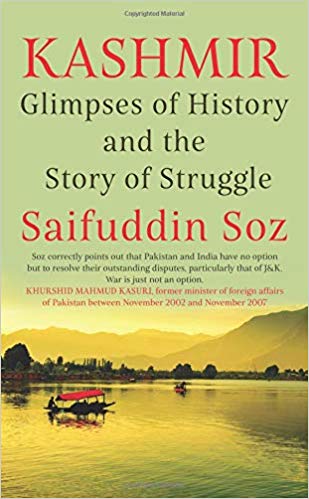Saifuddin Soz hit the national limelight when his lone vote in the Lok Sabha brought down the Vajpayee II government. In 1999, the late Prime Minister Vajpayee was into the thirteen month of his second stint—the earlier one in 1996 being aborted in a mere thirteen days. Vajpayee’s coalition lost the No Confidence Motion in April 1999 by the narrowest margin possible of one vote—attributed to Soz voting against the whip of his party, the National Conference. He later joined the Congress Party and became a minister in the Manmohan Singh government. Alongside, he served to further the United Progressive Alliance government’s outreach to disaffected Kashmiris in a period when the peace initiatives were at their most credible mark. In the event, the Manmohan Singh government was unable to deliver and peace remains elusive in Kashmir a decade on. The book under review is therefore timely. Disturbed by the continuing unrest since the killing of Burhan Wani, an icon of Kashmiri militancy, Soz returns to his long- standing position that the problem in Kashmir is not one of law and order, but is a political problem. As a political problem, it behoves a mutually negotiated political solution. This is useful to reiterate at a time when the ruling party at the Center has chosen to bring down the provincial coalition in which it was partner in Srinagar. Though there is a special representative in place and a governor with a political background has been appointed after over a half century of non-political governors in place in Raj Bhawan, it is equally clear that in an election year political initiatives are unlikely. As for the elephant in the room—Pakistan—the change in government there to one headed by Imran Khan and his proposal of a return to talks is unlikely to change the Indian position on ‘no talks without an end to terrorism’ before national elections next year.
Given that the status quo in terms of militancy and disaffection is set to continue in Kashmir for another year, the book provides ballast for peace voices. It is altogether for the good that the release of the book attracted controversy. The saffronite media had it that in his book Soz was advocating ‘azadi’—defined by them as freedom—for Kashmir. Soz gamely defended his view that azadi to Kashmiris is not self-determination as much as a release from the political stranglehold India has acquired over its affairs ever since it dismissed and imprisoned Sheikh Abdullah in 1953. To this has been added the militarized template over the past three decades. Soz defends Kashmiris wanting out of this bind. He courageously also calls on the Hurriyat—the hold-out political formation there—to moderate its position on talks.

